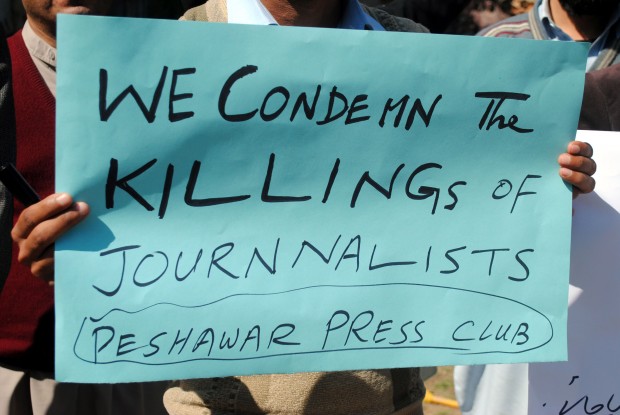
RSF says 110 journalists killed in 2015, calls UN to take action

According to Reporters Without Borders (RSF), a total of 110 journalists were killed around the world in 2015, many of whom died in war zones but the majority were killed in supposedly peaceful countries.
Sixty-seven journalists were killed in the line of duty, RSF stated in its annual roundup. It listed war-torn Iraq and Syria as the most dangerous places for journalists with 11 and 10 fatalities respectively, followed by France, where eight journalists were killed in a militant assault on Charlie Hebdo in early 2015.
A further 43 journalists around the world died in circumstances that were unclear and 27 non-professional “citizen-journalists” and seven other media workers were also killed.
Calling for the United Nations to take action, the report affirmed that the high toll is “largely attributable to deliberate violence against journalists” and demonstrates the failure of initiatives to protect media personnel.
The report spoke of the growing role of “non-state groups” — often militants such as the Islamic State group — in perpetrating atrocities against journalists but interestingly, in 2014, RSF had reported two-thirds of the journalists killed were in war zones while in 2015, it has been the exact opposite with “two-thirds killed in countries ‘at peace’.”
“The 110 journalists killed this year need a response that matches the emergency. A special representative of the United Nations secretary-general for the safety of journalists must be appointed without delay.”
Including the 67 deaths, the total number of journalists who were murdered, knowingly targeted or killed in the course of their work since 2005, totals to 787.
The RSF report also singled out India, where nine journalists had been murdered since the start of 2015, some of them for reporting on organised crime and its links with politicians and others for covering illegal mining.
“Their deaths confirm India’s position as Asia’s deadliest country for media personnel, ahead of both Pakistan and Afghanistan,” RSF said, urging the Indian government to establish “a national plan for protecting journalists”.
In Bangladesh, four secularist bloggers were killed in acts claimed by local militants.
“The passivity of the Bangladeshi authorities in the face of this bloodbath has fostered a climate of impunity that is extremely dangerous for citizen journalists,” RSF said.


